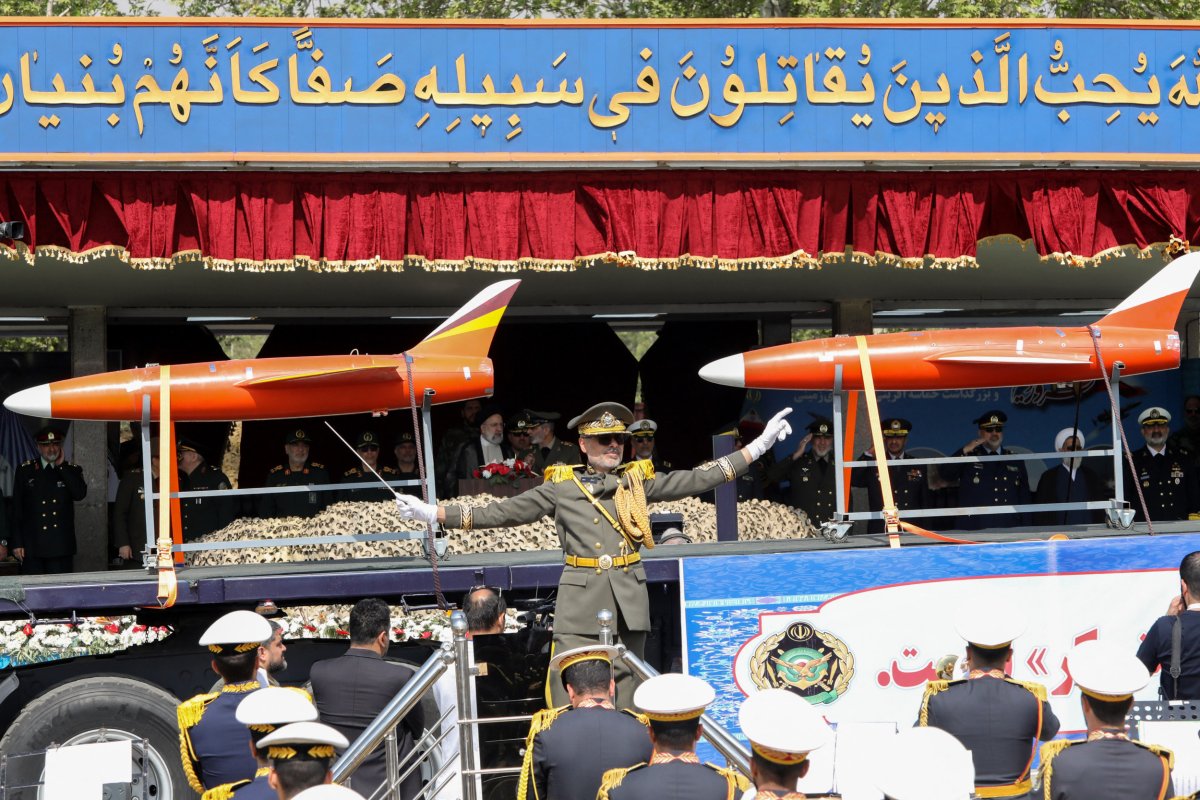The far-reaching consequences of Iran's strike against Israel this past weekend are still coming into focus. But what's already clear is that they extend not just to Israel, Iran, and the United States but also to many, if not all, Arab states—none more so than the Kingdom of Saudi Arabia.
This crisis, in fact, presents an opportunity for the Biden administration to finalize the details of a new U.S. security guarantee for Saudi Arabia.
For Riyadh, which has spent more than a year seeking an ironclad U.S. security guarantee, the Israeli missile defense systems, Iron Dome and Arrow-3, along with allied efforts from the U.S., UK, France, and Jordan—to defend against approximately 350 cruise and ballistic missiles and drones Saturday evening—demonstrated an advanced version of the future the Kingdom is desperate to attain.

All countries' foreign policies are to varying degrees predicated on their domestic agendas. But Saudi Arabia is currently at the extreme end of the spectrum. What matters most to Riyadh is the opportunity to ensure the economic transformation of the country is a success, a desire never greater than today when the Kingdom is having to scale back its most imaginative and futuristic Vision 2030 project, Neom.
The determination by Saudi Crown Prince Mohammed bin Salman to successfully transition the Kingdom away from hydrocarbons—and toward phosphate production, green energy, tourism, and other emerging revenue generators—is why he is so driven to make Vision 2030 a success.
But if Iranian or Iranian-backed proxies launch drones or missiles at the Kingdom in the coming years, there will not be enough political risk insurance in the world to enable the Saudi economic and societal transition to continue at the pace and in the manner MbS views as necessary.
That conclusion is what drove the Saudi-Iran rapprochement last year—an effort by Riyadh to hedge and prevent renewed conflict with Iran. And it's what's driving Saudi Arabia's long-term efforts to attain new security guarantees and support from the United States.
On Sunday, Khalid bin Salman, the minister of defense and full brother of MbS, tweeted two sentences following his call with U.S. Secretary of Defense Lloyd Austin, the first of which was, "....we [the Kingdom and US] reviewed our strategic defense partnership and explored ways to further enhance it." That KbS's focus was first on US-Saudi defense relations, and only then did he address the issue of possible regional conflict, was not a mistake—it was a clear reflection of Riyadh's current priorities.
On Saturday evening into early Sunday in Riyadh, Saudi leaders almost certainly marveled at the overwhelming success of Israel's defenses and the support it received. This is juxtaposed to Riyadh's own desire for such protections and driven by fear given the closer geographic proximity between Saudi Arabia and Iran—which will reduce warning time of an incoming attack and could lead Riyadh to a place of enhanced flexibility.
Israel is unlikely to be comfortable with Saudi Arabia having the same layered defenses it demonstrated Saturday, based on its insistence on retaining its Qualitative Military Edge. But given the insufficient defenses Saudi Arabia has now to protect the country and its population from attacks, while Riyadh might desire Israel's level of defenses, it is likely to be satisfied with less.
More important will be the commitments the U.S. provides Saudi Arabia in the event it is attacked. It is realistic to imagine Washington agreeing to undertake a similar defense in helping to shoot down Iranian or its proxies' missiles and drones aimed at Saudi Arabia, as the U.S. did in conjunction with Israel on Saturday evening. But here too, Riyadh may be flexible, seeing what was possible Saturday in contrast to having bitterly, five years ago, lived through the physical and psychological impact of an Iranian attack in which the U.S. and other allies were not there to provide support.
And such flexibility will be critical when it comes to normalization with Israel and the issue of a U.S.-proposed "time-bound, irreversible path to a Palestinian state," key parts of the deal to gain U.S. security guarantees and a civilian nuclear program. All three components are interlocking aspects of the long-shot "grand bargain" that the Biden administration has been pushing as the capstone to end the current war in Gaza. But while the chances of success for a grand bargain are low, the sooner the administration is on the same page as Riyadh, the sooner they can work in concert to cajole both Israel and the Palestinians toward a common path forward.
The Saudi and broader Arab street will not tolerate Saudi normalization with Israel that leaves the Palestinians out in the cold, especially as Israel's war against Hamas, and the resultant humanitarian crisis, continue in Gaza. But Saudi Arabia—driven to reach a deal to satisfy its own security demands in light of Iran's attack on Saturday—may today be more willing to prioritize the "irreversible path" portion of that statement; especially since the Palestinian Authority lacks the legitimacy to be the executor of one and there is no possibility Israel will agree to a Palestinian state in the immediate future.
Prioritizing the "irreversible path" aspect as opposed to a short timeline, is likely to be the only way an Israeli leader could even begin to consider such a deal, given how wide-spread Israeli opposition is to a Palestinian state following Hamas's Oct. 7 terrorist massacre.
Crises have a way of clarifying what's most important to both people and states. There has, ironically, never been a more opportune time for Washington to finalize, in detail, the contours of a security agreement with Riyadh.
Jonathan Panikoff is director of the Atlantic Council's Scowcroft Middle East Security Initiative and former deputy national intelligence officer for the Near East at the National Intelligence Council.
The views expressed in this article are the writer's own.
Uncommon Knowledge
Newsweek is committed to challenging conventional wisdom and finding connections in the search for common ground.
Newsweek is committed to challenging conventional wisdom and finding connections in the search for common ground.
About the writer
To read how Newsweek uses AI as a newsroom tool, Click here.








